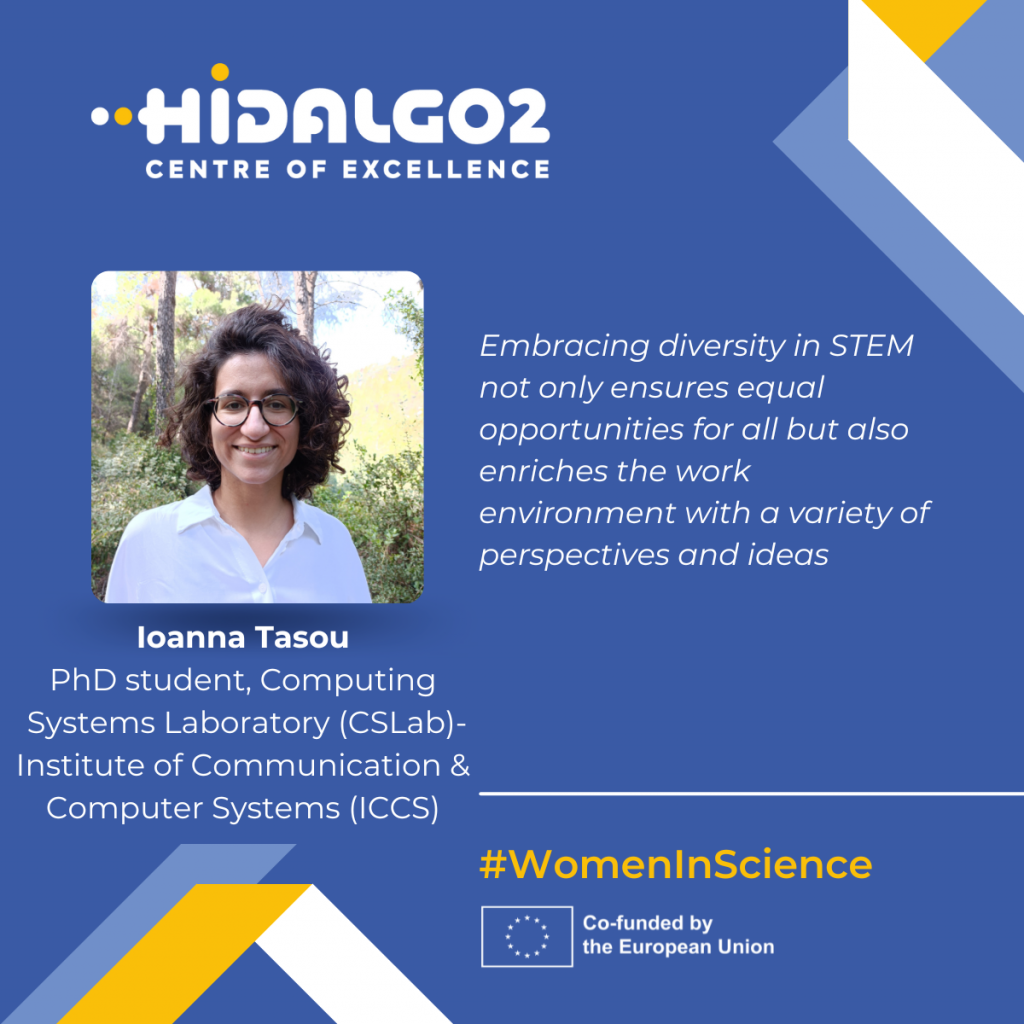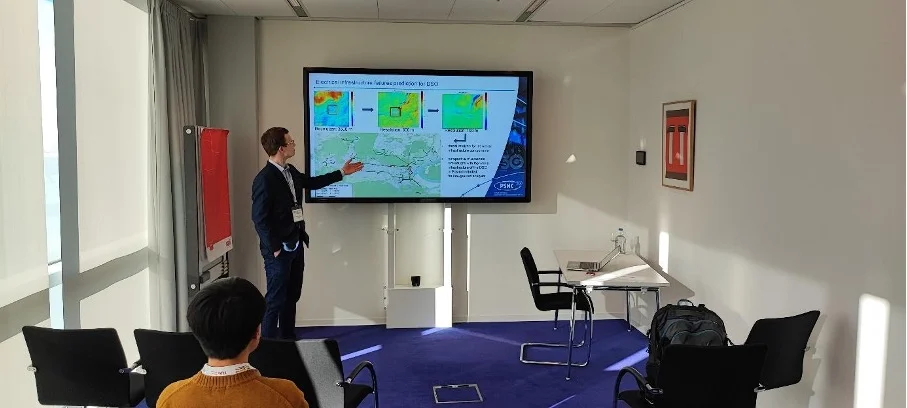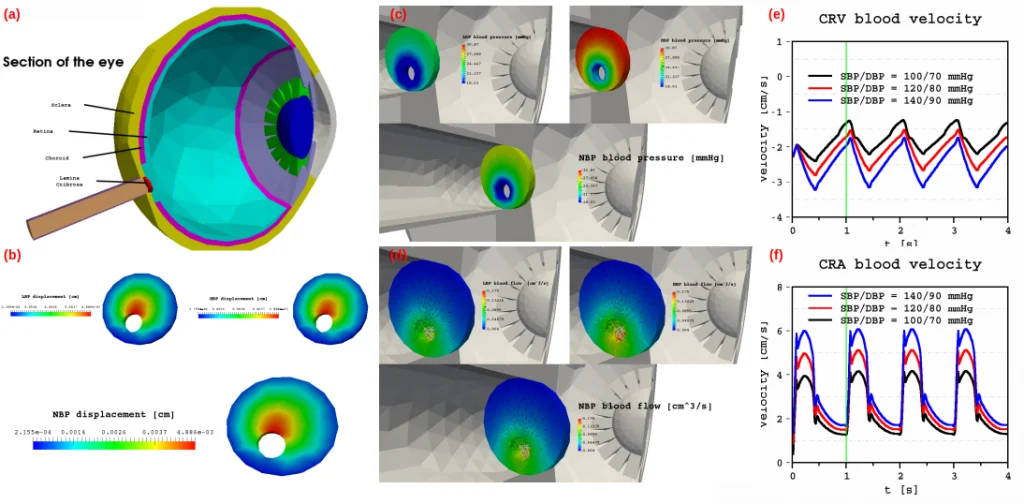
Our initiative leading up to “Women in Science Day” on February 11, 2024, continues with an interview featuring Ioanna Tasou, a Ph.D. candidate affiliated with the Computing Systems Laboratory (CSLab) at the Institute of Communication and Computer Systems (ICCS), a pivotal partner in the HiDALGO2 project. We explored her involvement in the project, the diverse roles she has assumed, her contributions, and the importance of women holding leadership roles in research projects.
Ioanna specialises in parallel processing, High-Performance Computing (HPC), and FPGA accelerators. Her Ph.D. focuses on optimising the SpMV kernel on HPC systems and other computing platforms. Let’s hear her thoughts on the role of women in the science field.
How did you initially become involved with HiDALGO2, and what motivated you to contribute your expertise to this project?
I initially became involved in HiDALGO2 due to my strong interest in high-performance computing. Recognising the tremendous potential of HPC, I was particularly enthused when I realised its application in addressing environmental problems. Contributing my expertise to this project allows me to align my passion for cutting-edge technology with a meaningful commitment to solving pressing environmental challenges.
In your role within HiDALGO2, how do you contribute to the project’s mission?
As a new member of HIDALGO2, I contribute to the benchmarking of the project’s pilots in different HPC systems. My main responsibility is to study the characteristics of its separate HPC system and help pilots adapt their code to them. Using Reframe, an HPC test and benchmarking framework, we create Python-based test workflows to reduce the complexity of benchmarking in these systems. We also facilitate the migration of the benchmarks on various Euro-HPC systems by providing a shared test and reporting layout and the same organization of the log files at the post-processing stage.
Recognising the tremendous potential of HPC, I was particularly enthused when I realised its application in addressing environmental problems
As a woman working on a STEM-related project like HiDALGO2, what are your thoughts on the importance of gender diversity in the field?
As a woman working on a STEM-related project like HiDALGO2, I believe that gender diversity is of utmost importance in the field. Embracing diversity in STEM not only ensures equal opportunities for all but also enriches the work environment with a variety of perspectives and ideas. Women bring unique skills and insights to the table, fostering innovation and enhancing the overall effectiveness of projects.
HiDALGO2 may have women in leadership positions. Can you share your perspective on the importance of women holding leadership roles in projects like this?
The presence of women in leadership positions within projects like HiDALGO2 is crucial for ensuring a more holistic approach to problem-solving. Women bring a unique set of skills and perspectives to leadership roles. Their organising skills are often exceptional, contributing to effective project management and coordination. In addition, women are often characterised by a caring and empathetic approach, which can be particularly beneficial in projects related to the environment. Their commitment to sustainability and a genuine concern for the well-being of the planet can lead to more comprehensive and conscientious strategies in addressing environmental challenges.
Women bring unique skills and insights to the table, fostering innovation and enhancing the overall effectiveness of projects
Looking ahead, what are your hopes and expectations for HiDALGO2’s role in the HPC field?
I believe HiDALGO2 has the potential to enrich the HPC landscape by shifting its focus from purely performance-driven pursuits to actively contributing to the solution of pressing global challenges. Through European initiatives and cooperation, I anticipate HiDALGO2 leading the way in leveraging high-performance computing for meaningful applications, particularly in addressing critical issues like the environmental crisis. The project’s commitment to problem-solving aligns with a broader vision of utilising HPC not just for technological advancements but as a tool to drive positive and impactful change on a larger scale.
What message or advice would you like to share with women who aspire to work in STEM fields, especially those interested in making a positive impact on the environment?
Your gender should not be a limiting factor in pursuing your career goals. In the fields of science, technology, engineering, and mathematics, everyone has the potential to contribute valuable insights and innovations, regardless of gender. Your unique perspective, creativity, and skills are essential in addressing the complex challenges our planet faces. Embrace your strengths, be confident in your abilities, and recognise that diversity in STEM is crucial for driving innovation and finding effective solutions to environmental issues. Remember that being a woman in STEM is not a limitation but a strength. Your diverse experiences and viewpoints can lead to fresh ideas and approaches that contribute to the collective effort to create a more sustainable and environmentally friendly world. Surround yourself with a supportive network of mentors and peers who recognize and appreciate the value of diversity in STEM.
In the fields of science, technology, engineering, and mathematics, everyone has the potential to contribute valuable insights and innovations, regardless of gender
Write a quote that summarises your opinion about “Women in science”
No special term for women, just “people in science”.



